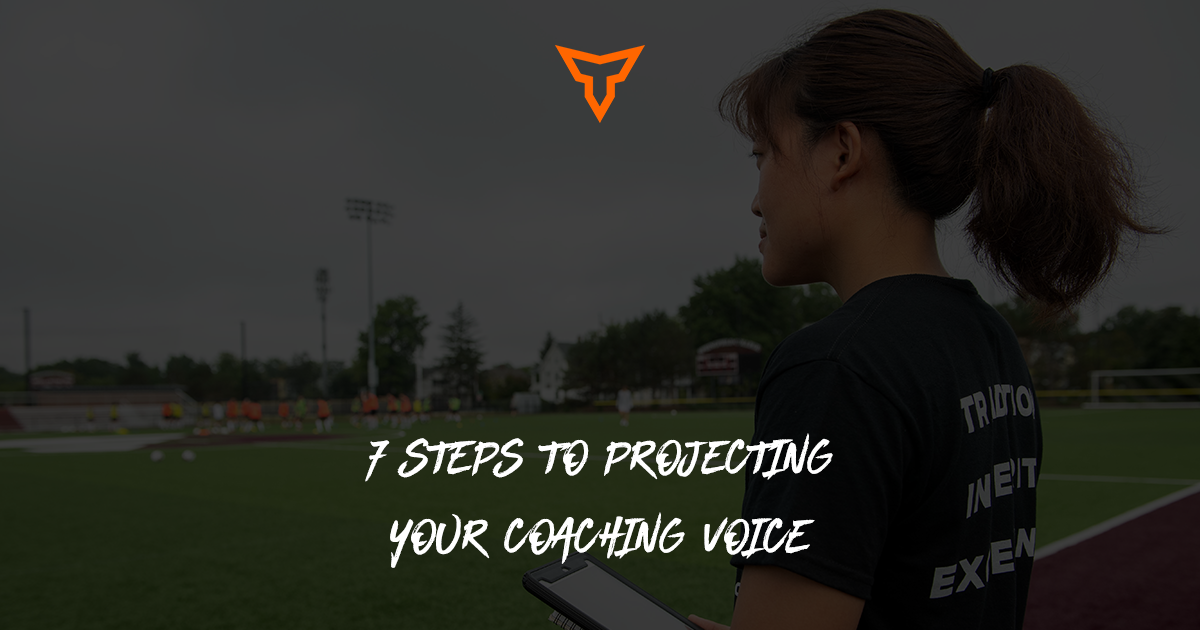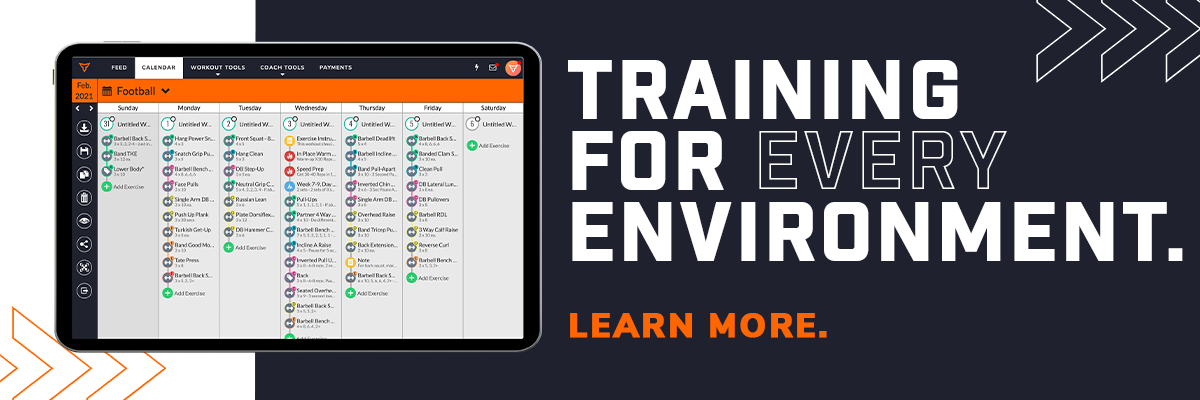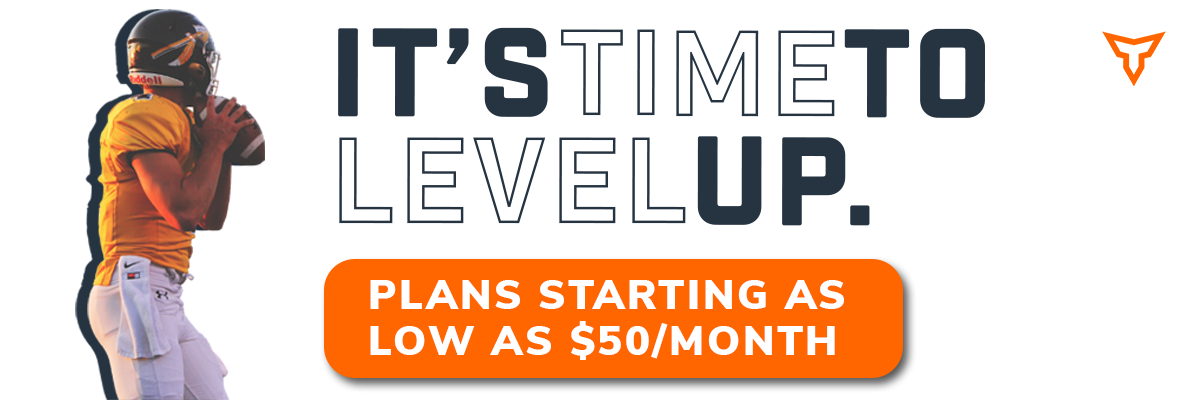Benefits of Building a Social Media Brand as a Strength Coach
A few weeks ago, I was talking to a young strength coach and he asked what I thought was a phenomenal question from a young coach; “What’s one thing you wish you had started to do earlier in your career?” I immediately answered “First, learn how to say no. Second, start building a brand immediately.”
Yes, I’m going to talk about social media. Yes, I’m going to talk about multiple streams of income. Yes, I’m going to talk about going after what you’re worth. I know there are still coaches firmly planted in the “do what you’re told, stay out of the spotlight, and just be grateful to have a job” camp. That may have worked for a long time, but things are changing.
In an industry constantly searching for a competitive advantage, embracing and learning the art of brand building should be a no-brainer.
Whether we admit it or not, when most people hear a name they’re unfamiliar with, they whip out their phone and do a search; Facebook, Instagram, Twitter, etc. Wouldn’t you want to do what’s in your power to control what that search shows?
If you want to talk 1x20 you go to Jay Demayo. Got a question about Velocity Based Training? Go to Bryan Mann. Baseball “specific” work? Talk to Zach Dechant. Exploring movement patterns? Vernon Griffith. You can see the trend here…these coaches have controlled their narrative. They’re known for their expertise in specific areas and for providing value through informative social media posts and/or other content. This isn't saying that you're going to automatically get your dream job, but it definitely doesn't hurt to be known for providing consistent value to the profession.
If you look at the sports performance/fitness industry as a whole, it doesn’t take long to see the private sector has a huge jump on the branding aspect of coaching. There are good, bad, and ugly coaches flooding social media with information, tips, and “hacks”. While admittedly, some of these can be classified as circus acts, there are plenty of men and women out there who are pushing our industry forward with informative posts, discussions, infographics, etc.
Then there’s the collegiate side…now I recognize the inherent differences between the demographics. Private sector coaches, on some level, have to sell themselves and their product to fill their gyms. College coaches get handed their team from the recruiting efforts from the sport coaches. So, does that mean that because we don’t have to “sell tickets” we shouldn’t be actively building our brands on social media?
I would argue the pandemic has kicked the door down and shown everyone the importance of social media in our industry. We’ve seen some young up-and-coming coaches really capitalize on the ability to share information and build a brand via social media and technology during these times. There are multiple examples I can think of where coaches did a great job executing on social media which led to speaking opportunities, podcast appearances, and as a byproduct in some cases, big-time jobs. Now, it’s important to recognize that social media presence alone WILL NOT get you a job. Nobody was ever hired because they had a killer Insta alone. People have been hired however because they have the experience, network, and utilize social media.
Maybe our industry is still too prideful to admit it, but there are strength coach “influencers”. Not in the traditional "Gen-Z" sense of the word, but in the sense that there are strength coaches with a great social media presence who are influencing our field through practical application such as exercise demos and explanations, opinion pieces, or even just well-designed hype videos. In fact, I’ve had sport coaches at D1 schools ask during an interview if I am comfortable with video editing software. Still think getting comfortable with technology and social media is a waste of time?
I’m not advocating that we live our lives behind our phones or sacrifice any quality in the service of our student-athletes, but if the opportunity to build a brand is there, it may be wise to take it.
What follows are a few tips and tricks for coaches who are looking to start diving into some form of brand building:
Pick Your Medium
1. Twitter
Strength coach twitter is where you go to find all the latest arguments and trash talk from keyboard warriors who wouldn’t bust a grape in a fruit fight. Everyone gathers here to share their hot takes, speak in absolutes, armchair quarterback every video or post that gains traction and condemn everyone who has opposing philosophies and beliefs. All jokes aside, some coaches are sharing some great content on Twitter. Alan Bishop would be the prime example here. Personally, I think Twitter offers a unique challenge as it forces you to be clear and concise with your thoughts because of the character limit.
2. Facebook
Strength coach Facebook groups exist and some are highly beneficial and informative especially as a place for young coaches to pick the brains of older coaches. The easiest places to start are the NSCA special interest groups as there is always a large amount of information being shared through these.
3. Instagram
Instagram seems to really be where the action is at. It offers the ability to give video examples and in-depth information via the caption. For those reasons, we will use Instagram as our framework for most of the tips and tricks.
4. LinkedIn
Although not as popular as the other social media outlets, LinkedIn is a great place to share long-form articles or thoughts. It also has a much more “professional” feel to it. It’s also where you’ll find the majority of administrators. Remember that whole “we want a seat at the table argument”? (Hint, hint).
Quality and Quantity
Most of the things in this section should go without saying, so I’ll keep it brief...
- Make sure the picture/video is solid – if you’re going to take the time to post it, take the time to proof it. Look professional & capture what you want to capture
- Educate and engage – use captions to clarify, provide in-depth commentary, or present ideas
- Don’t make excuses – we know you’re not perfect and your weight room isn’t perfect. Neither is ours, don’t waste time making excuses or tearing your own athletes’ technique apart to save your ego. Use it as a learning moment or don’t post it at all.
- Be consistent – if you’re going to have people looking to you for information, you have to deliver with some level of consistency aka more than once in a while
The coaches who have taken full advantage of social media as a tool have done so by engaging in all 4 of these tips. They post good photos/videos from angles that are useful to illustrate the point being made. Notice I didn’t say professional photos or videos. We don’t have to be Instagram models, nor do we need their editing skills. A well-executed iPhone video of an athlete or a coach doing an exercise will suffice. The winners of the social media arms race also do a great job presenting their theories and ideas in digestible formats. Don’t use overly scientific wording just to sound smart, use it when applicable.
Authenticity
Your “brand” needs to represent you. Your values, your beliefs, your personality. I’ve seen some young strength coaches who begin to build their brand on social media and then fall into the trap of trying to be an exact replica of another successful coach. Here’s the thing, just like with training, the best programming is the one you can coach. The best “image” is the one that’s real. Be who you are. Don’t take yourself so seriously. The truth is, we’re all figuring it out, so be you. Maybe your game is adding humor to dry training content. Maybe you’re a great technician and you find a way to convey detailed coaching cues and demonstrations. Find your superpower and use it to convey your values and your message.
Engage, engage, engage
Social media is meant to be exactly what it says…social. Yet, so many times coaches use it as their personal manifesto or ranting space. Are there coaches who have gained a reputation solely by stirring the pot? Absolutely. But I can tell you first hand that reputation is not one you want. Instead, use social media to engage with other coaches. Have discussions, ask questions, and build relationships. I have made some great friends that started as a simple follow-up message to a post or taking the time to let them know I respect and appreciate what they’re sharing.
For young coaches, social media completely changes the game when it comes to networking. Coaches are literally one message away. No more digging through directories or following the 6-degrees of separation (more like 3 in college S&C) flowchart to get contact info for a coach you’d like to meet. As a young coach, if you don’t feel you have something to add to the conversation (I’d argue that everyone can add something), social media can be a great place to ask questions.
Engaging on social media also gives the unique opportunity to find common ground beyond sport performance. Many coaches share personal interests as well from hiking to grilling and family. This is important for multiple reasons. First, it humanizes us as a profession to both each other and the outside world which is never a bad thing. Second, it provides a jumping-off point for young coaches to connect with others. I’ve never heard of someone sending a mean response to a “I love golden retrievers as well!” message. Third, it allows us to connect with our athletes appropriately and on a level they relate to if we choose to. Lastly, and most importantly, the number of family photos shared by coaches serves as a much-needed reminder of why we do what we do and that we are more than coaches.
Here are some tips for engaging with other coaches on social media:
- Look for opportunities to celebrate, challenge (respectfully), or collaborate
- Ask questions that explore ideas not confirm your beliefs
- If you can google the answer, don’t ask it
- Don’t be afraid to send the first message
- FOLLOW UP!!!
Diversify
1. Ideas
As I alluded to in the previous section, one of the biggest problems with social media is people’s natural tendency to surround themselves with ideas that complement their current beliefs. For example, if I am a fan of the Conjugate system, I probably follow and/or engage with more coaches who also align with those principles. Therefore, I am now creating a “safe space” for ignorance to grow. But, wait, I thought we only did that with politics? Nope. It happens across all areas.
Social media branding should be an opportunity to engage and educate people across belief systems, industries, etc. For that to happen, you have to be willing to seek out, digest, and investigate ideas and pages that don’t necessarily align with your personal beliefs. Educate yourself across the spectrum to become more well-rounded and perhaps even more grounded in what you already believe, but without blinders.
2. Opportunities
Another form of diversification usually comes disguised and you have to look for it. I’m talking about opportunity. By building a brand on social media, you’re establishing yourself as an expert in your field. This, combined with the resume and practical experience makes you attractive and easy to find for both people in and out of the field. This scenario can lead to some unique opportunities. These can include things like:
- Consulting roles – usually low work/time investment with a pretty substantial financial return
- Speaking opportunities – can be a keynote, workshops, podcast interviews, etc.
- Writing opportunities – blogs, e-books, etc.
- Online programming/Coaching – TeamBuildr happens to have a great support system for this
Underlying this entire article is the critical understanding that social media is a tool. It’s a valuable tool that can be used for growth both professionally and personally IF it’s utilized correctly. I’ve also seen plenty of coaches make career-altering mistakes on social media, but that’s a conversation for another day. Social media offers opportunities to build relationships, engage in professional development, and even create additional streams of revenue.
The challenge is similar to the one we face in the weight room. How do we make it transfer? We have to find a way to transfer the skills and relationships from social media to the real world so it’s not just about building a brand, but also about living that brand -- connecting with the people we engage with on social media, utilizing those relationships to create meaningful connections, and ultimately a stronger network. It means doing our research, reading, experimenting, and ultimately applying some of the concepts our colleagues are sharing to become a better strength coach. It means not being afraid to monetize opportunities we encounter through social media (within university guidelines). This is especially true if those monetization opportunities check-off both of the following boxes. 1) Add value to others 2) Provide a better life for you and your family.
At the beginning of this article, I said that social media wouldn’t get you a job, and I stand by that. I also said that a social media brand wouldn’t get you a job; I stand by that as well. What building a social media brand will do is create opportunities for you to control your narrative, be creative, build new and valuable skills, engage with other coaches and businessmen, and cultivate new relationships. I'd be willing to bet these are all positives in the eyes of potential employers. Happy posting!
Subscribe to our blog
Subscribe to receive the latest blog posts to your inbox every week.
Related posts
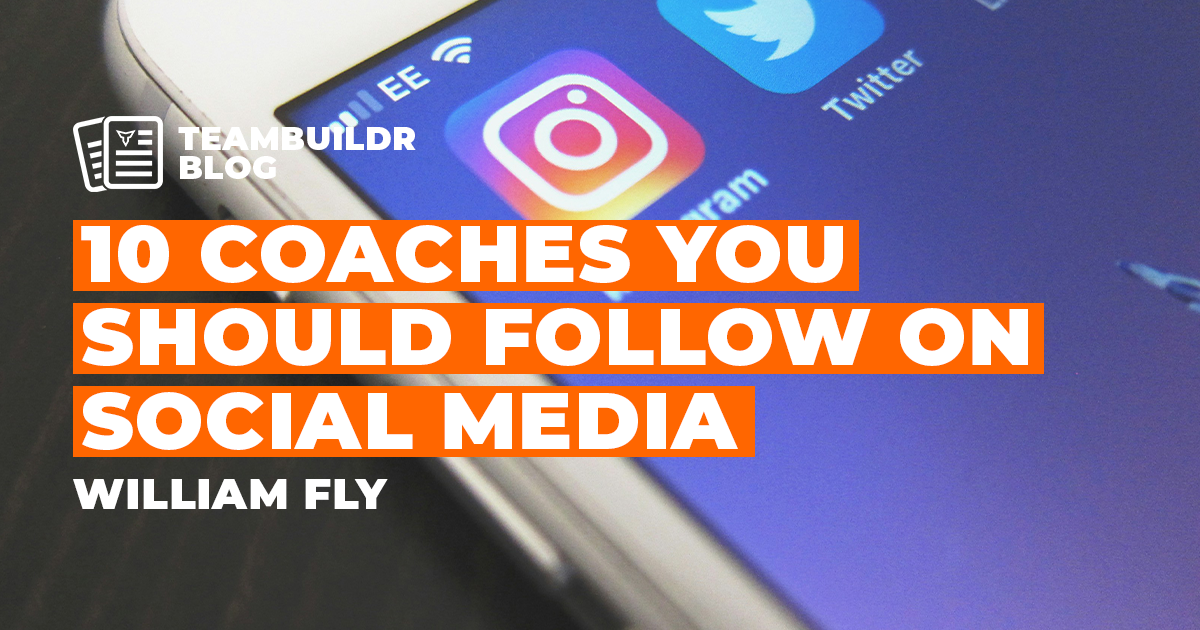
10 Coaches to Follow on Social Media for Inspiration
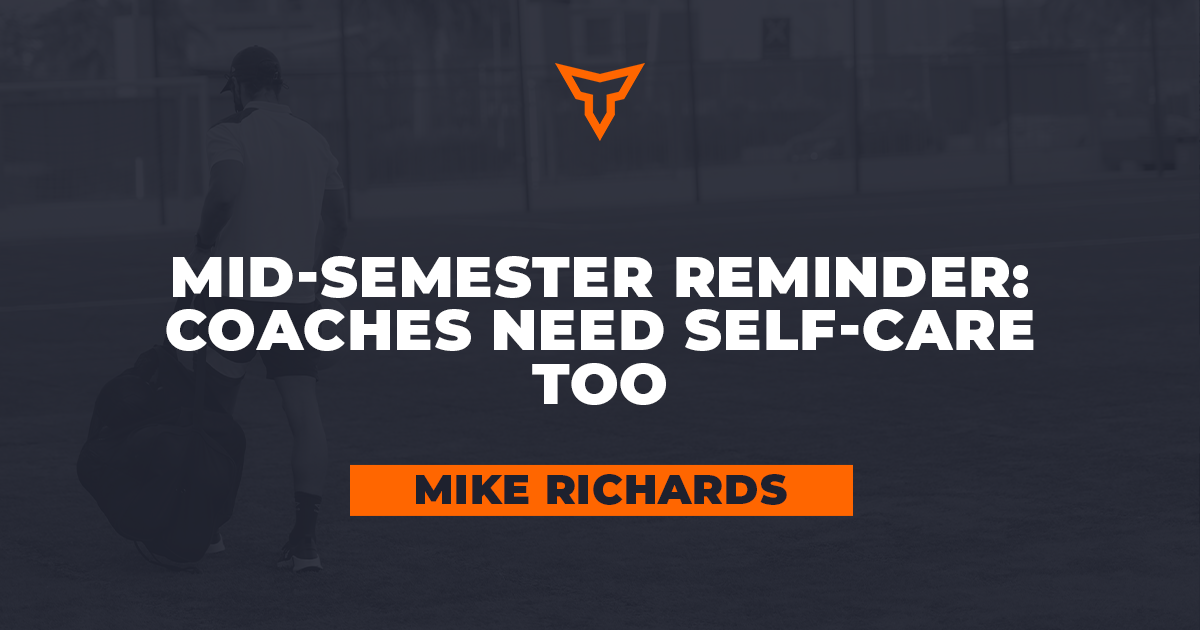
Mid-Semester Reminder: Coaches Need Self-Care Too
